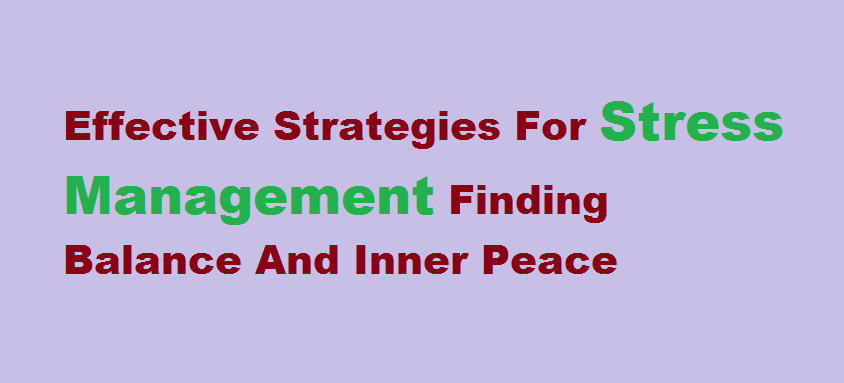Effective Strategies for Stress Management Finding Balance and Inner Peace
4 min read
Introduction
In today’s fast-paced and demanding world, stress has become an inevitable part of our lives. While it is natural to experience stress, prolonged exposure can have detrimental effects on our physical and mental well-being. Therefore, it is crucial to develop effective strategies for managing stress. This article aims to provide you with unique and informative insights into practical techniques that can help you navigate through stressful situations and find balance and inner peace.
Understanding Stress
Stress is the body’s response to challenging or threatening situations, whether real or perceived. It triggers a series of physiological and psychological reactions, such as increased heart rate, elevated blood pressure, and heightened alertness. While short-term stress can be motivating, chronic stress can lead to anxiety, depression, and various health issues. Recognizing the signs and symptoms of stress is essential for implementing effective stress management techniques.
Identifying Your Stressors
The first step in managing stress is identifying the factors that trigger it. Stressors can be external, such as work pressures, relationship issues, or financial concerns, or internal, such as self-imposed expectations or negative thinking patterns. Keeping a stress journal can help you pinpoint specific situations, events, or thoughts that contribute to your stress levels. Once you have a clear understanding of your stressors, you can work towards developing strategies to cope with them effectively.
Cultivating Healthy Lifestyle Habits
Adopting a healthy lifestyle can significantly reduce stress levels. Regular exercise, such as walking, jogging, or practising yoga, releases endorphins, the brain’s “feel-good” chemicals. Engaging in hobbies and activities you enjoy provides a much-needed break from stressors and helps recharge your mental energy. Additionally, maintaining a balanced diet, getting adequate sleep, and limiting caffeine and alcohol consumption can enhance your resilience to stress and promote overall well-being.
Practising Stress Reduction Techniques
Various relaxation techniques can help alleviate stress and induce a state of calmness. Deep breathing exercises, meditation, and mindfulness practices can restore inner balance and reduce anxiety. Progressive muscle relaxation involves tensing and releasing each muscle group to relieve physical tension. Guided imagery and visualisation techniques allow you to create a mental oasis of tranquillity. Experiment with different techniques and find what works best for you, integrating them into your daily routine.
Building a Support Network
Having a strong support network plays a crucial role in managing stress. Reach out to family, friends, or support groups to share your feelings and experiences. Social connections provide emotional support and offer alternative perspectives, helping you gain insight into your stressors and find solutions. Seek professional help if needed, as therapists and counsellors can provide valuable guidance and strategies for coping with stress.
Time Management and Prioritization
Proper time management is essential for reducing stress levels. Create a realistic schedule, prioritise tasks, and break them into smaller, manageable chunks. Avoid overcommitting and learn to say no when necessary. Effective time management reduces the feeling of being overwhelmed and increases productivity, allowing you to focus on one task at a time without succumbing to stress.
Embracing Mindfulness and Gratitude
Practising mindfulness involves being fully present in the moment, without judgement or attachment. Mindfulness enables you to observe your thoughts and emotions objectively, reducing stress and promoting self-awareness. Cultivating gratitude by acknowledging and appreciating the positive aspects of your life can shift your focus from stressors to blessings, fostering a positive mindset.
FREQUENTLY ASKED QUESTIONS
HOW DO I RID MYSELF OF STRESS?
Stress works a lot like homework. You don’t do it every day, and eventually, it’s going to pile up into a huge mess. Similarly, if you let your problems pile up; you will feel more and more stressed out. So the best solution is to deal with your problems, one at a time. Don’t let it overwhelm you.
WHAT ARE THE HEALTHIER WAYS TO REDUCE STRESS?
Coping with your problems one at a time helps. But there are certain situations like the death of a loved one, where you may find coping very difficult. Hence, in those situations, you should try first to accept the truth of the situation, and then try to understand your feelings, and only then you should try to manage them. And you can always seek assistance from friends and family for the execution of the last part.
Conclusion
Managing stress is essential for maintaining a healthy and balanced life. By understanding stress, identifying stressors, and implementing practical techniques such as cultivating healthy lifestyle habits, practising stress reduction techniques, building a support network, managing time effectively, and embracing mindfulness and gratitude, you can effectively navigate through stressful situations and find inner peace. Remember, it is within your power to manage stress and lead a fulfilling life.
Read Also : The Art of Freelancing Unlocking Your Potential in the Digital Age






